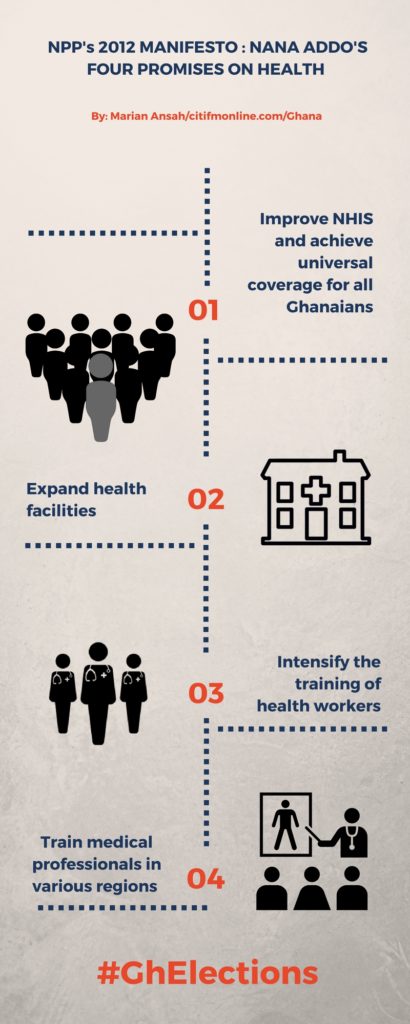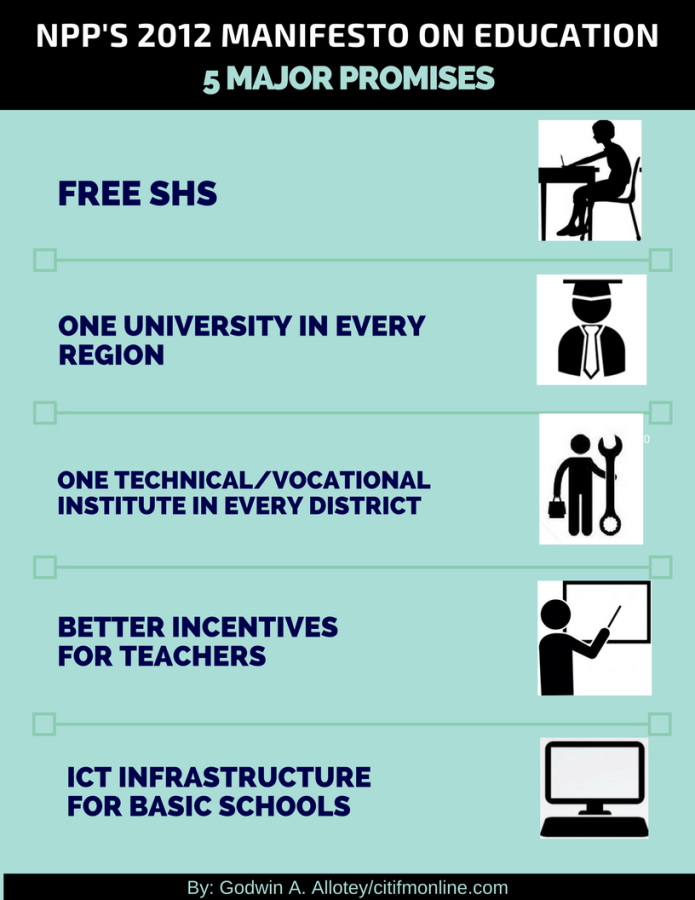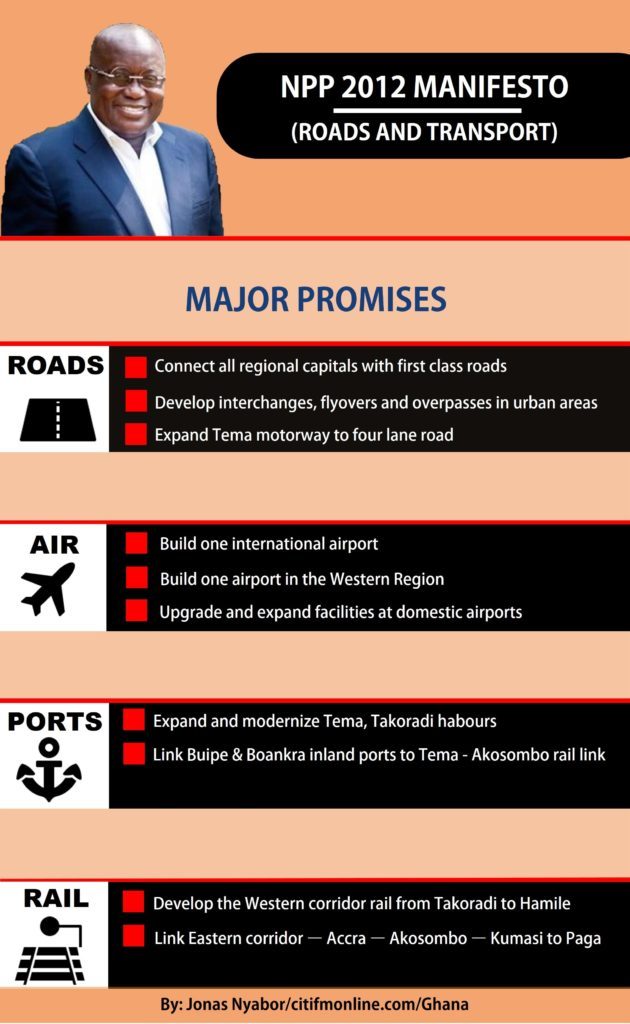The New Patriotic Party’s (NPP) has indicated that its 2016 manifesto will place emphasis on job creation and creating an enabling business environment for economic growth. But what did its 2012 manifesto, themed Transforming lives, Transforming Ghana”, focus on?
Ahead of the NPP’s 2016 manifesto launch today [Sunday], we look back at some of the promises the party made in its ultimately unsuccessful bid for power in 2012.
The economy
A major part of the NPP’s plan for economic transformation was industrialisation which would involve adding value to raw materials instead of just exporting natural resources unprocessed.
The party also noted that by industrialising the economy a significant number of jobs could be created by increasing agricultural production and adding value to products through agro processing.
The supporting and promotion of local industries, especially small- and medium scale entrepreneurs and businesses would be engaged in to ensure competitiveness in import substitution and exports.
Natural resources cited for development included oil and gas, salt, gold, bauxite, iron ore, manganese and agricultural products.
The formalisation of the economy was also touted by the NPP and it planned to do this by completing the National Identification system, undertaking a comprehensive mapping of the entire country with the objective of improving the planning and land tenure systems, bringing all lands under the formal sector and moving from a cash economy to electronic payments.
Health
Ahead of the 2012 polls, the NPP identified poor access, high mortality rates, a deteriorating National Health Insurance Scheme (NHIS) and a fake 30% of drugs that enter Ghana’s markets as some of the problems confronting the health sector.
The party also placed priority on the training and placement of midwives nationwide, given acute current shortages especially in some of the areas recording high maternal mortalities.
The party said it would work towards reviving the implementation of the original Kufuor policy of free maternal healthcare and free healthcare for less than 18 year olds.
It also pledged to facilitate the increased training and placement of midwives countrywide along with the prioritisation of maternal and adolescent reproductive health.
Additionally, the party assured it would pay more attention to mental health and increase and improve the mental health facilities and train more psychiatrists, clinical and social psychologists, and other mental health professionals.
In line with this, an NPP government would have worked with the private sector towards having three world class hospitals in the country to serve our people as well as the West African region under our medical tourism strategy.
Education
The NPP it its 2012 manifesto held that Ghana’s education system was in serious crisis. Thus it came out with its free Secondary Education policy promise that anchored its campaign ahead of the 2012 polls.
The NPP said it was committed to making secondary education free for every Ghanaian child and that would encompass free tuition, admission, textbook, library, science centre, computer, examination, utilities, boarding and meals.
Funding wise, the party said it would prioritise and fund the free Secondary education promise using budgetary resources, including resources from oil exports.
A teachers first policy was also trumpeted by the NPP that would focus on raising the support and quality of our teachers through monitored and evaluated training.
According to the NPP, its objective was to transform teachers to enable them lead the transformation of the quality of students via enhanced teacher training, monitoring and evaluation to ensure better performance in school and students results.
The NPP also committed to ensuring that basic education provided every Ghanaian with adequate literacy, numeracy and basic ICT skills. Thus it said it would work towards providing every basic school with ICT infrastructure to enable ICT education.
Housing
The NPP targeted the building of affordable housing units for rental across Ghana in a partnership between a proposed Housing Agency, Metropolitan Municipal and District Assemblies (MMDA) and the Private Sector (e.g. GREDA) in public-private partnership (PPP) arrangements.
It also planned to encourage MMDA’s to set up a dedicated “District Housing fund to provide infrastructure for social housing.
Fighting corruption
The NPP’s plan to tackle corruption was to employ preventive, detective, corrective and punitive mechanisms with an anti-corruption policy based on three key pillars; institutional reform, legislative reform and attitudinal change.
As part of these, the NPP manifesto promised independent prosecution as a remedy to the fact both the Commission on Human Rights and Administrative Justice (CHRAJ) and the Economic and Organised Crime Office need permission from the Attorney General to prosecute. The party also served notice of plans to boost parliamentary oversight
The party also planned to mandate the Attorney-General to report to Parliament on the potential liability of the State arising out of claims against the State and also report on judgment debts paid and those due and owing every six months.
The NPP 2012 manifesto proposed an effective Assets Declaration Regime by fostering a working environment for asset declaration via effective monitoring of asset declaration by amending the law to require the Auditor General to publish periodically the list of all persons so required.
Sanctions were also to be put in place for the non-declaration of assets within the stipulated time frame which would result in a forfeiture of appointment, in the case of political appointees.
Power sector
In the Power sector the NPP said it would work with the private sector to increase output and will reopen negotiations with interested partners to develop and complete the mini-hydro power projects such as Pwalugu, Juale, Pra, Ankobra and Tano.
Good governance in the sector, to remove inefficiencies, and facilitate effective autonomy and ensure transmission and distribution reliability and security was also to be a priority.
The party spoke of an “Accelerated Oil Capacity Programme” which would target the training of Ghanaians in high job creation sectors including fabrications and installation, manufacturing of equipment and construction of oil and gas infrastructure in line with the apprenticeship model.
The party said it would also pursue the development of sources of renewable energy to diversify as well as ensure sustainability of our energy sources for at least a thirty-year period.
Agriculture
The NPP targeted the development of all four of Ghana’s breadbaskets to enhance productivity and production in selected food crops, mainly maize and rice, and high value cash crops as horticultural products.
The party presented an integrated approach to the agricultural sector under the Millennium Challenge Account (MCA) project which would recognizes that key constraints affecting the sector will have to be tackled simultaneously to produce sustained results.
In a policy toeing the line of the one district, one dam’s, the NPP intended to expand irrigation coverage Nationwide, especially in the Afram Plains and in Northern Ghana. The party planned to facilitate community-owned facilities like dams, boreholes, and dugouts to expand irrigation.
Transport
The NPP’s plan to improve the transport sector was to integrate and consolidate all modes of transportation to improve efficiency and hence cut down costs.
Roads-wise, the party intended to partner with the private sector to develop interchanges, flyovers and overpasses in urban areas to reduce vehicular traffic whilst connecting the regional capitals with first class roads.
Still with the private sector, the party also had plans to establish a modern rail network that would link the North to the South through the Eastern corridor Accra through to Akosombo, Kumasi and then to Paga mainly for the exploitation of iron ore reserves in the north.
–
By: Delali Adogla-Bessa/citifmonline.com/Ghana




